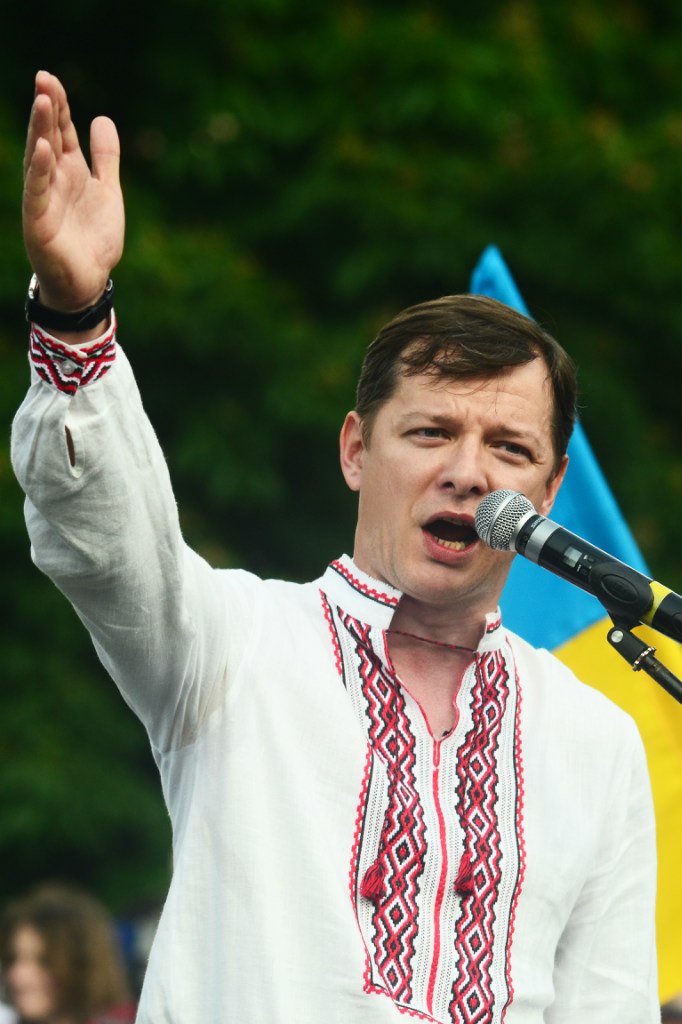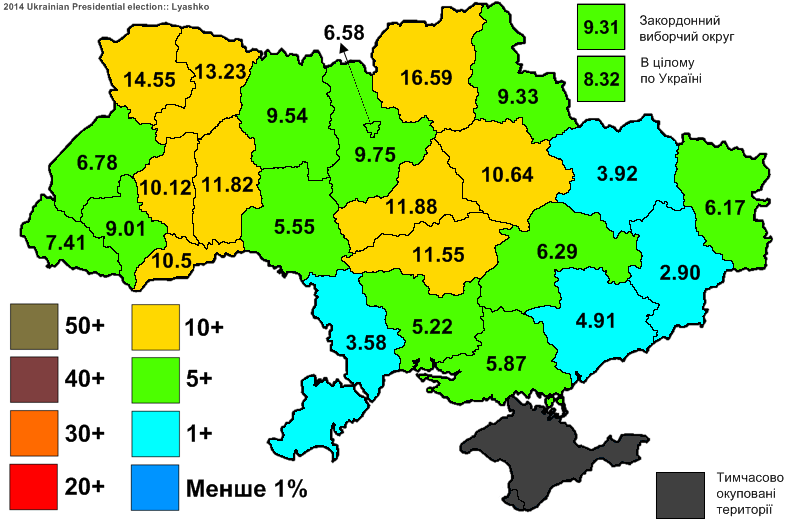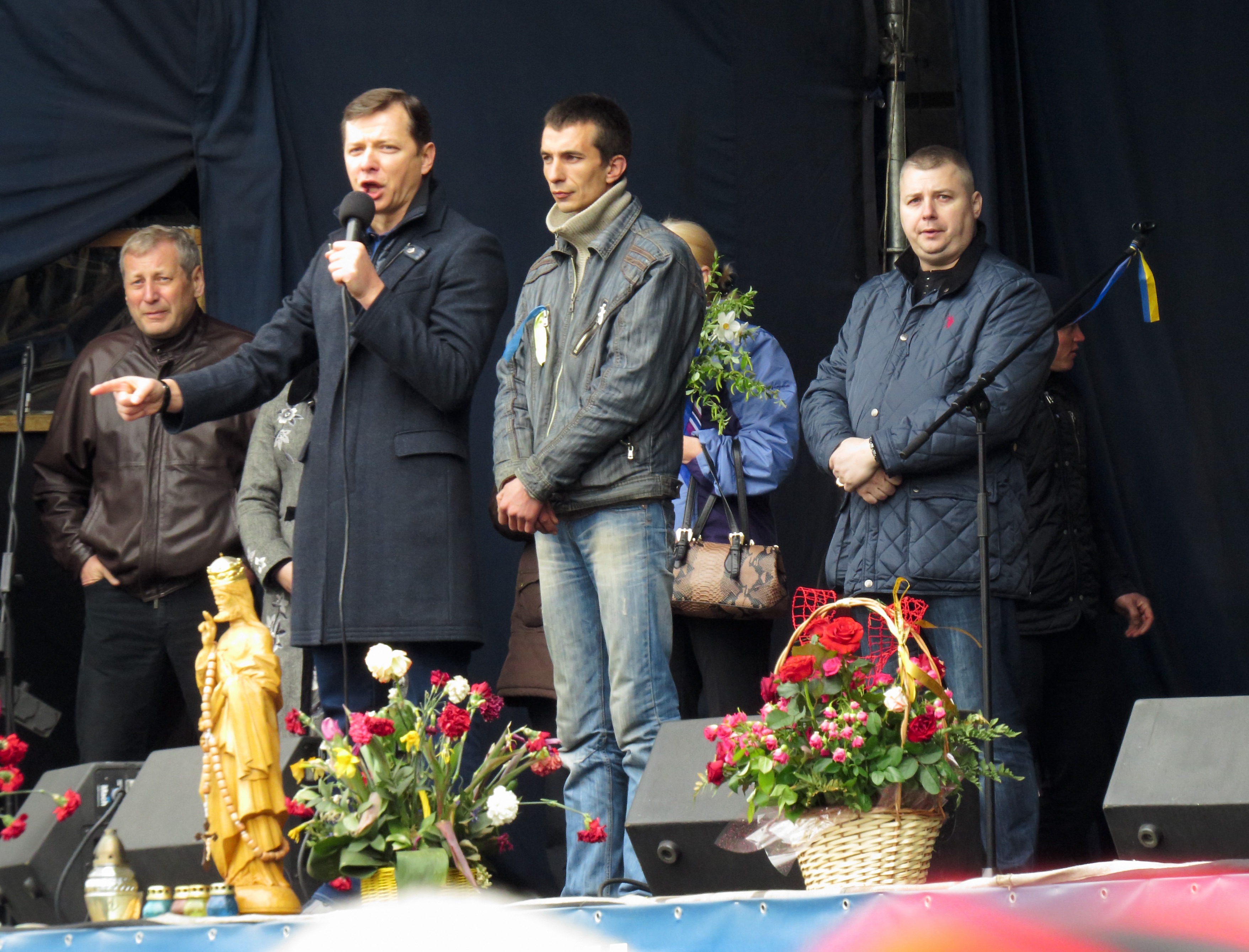1. Early Life and Background
Oleh Liashko's early life was shaped by challenging circumstances, leading him through various educational and professional experiences before he embarked on his public career.
1.1. Childhood and Education
Liashko was born in Chernihiv on December 3, 1972. However, he spent his childhood in the village of Lozovivka in Starobilsk Raion, Luhansk Oblast, where his mother resided. When he was two years old, his parents separated, and his mother was compelled to send him to an orphanage. He subsequently attended three different boarding schools: Yablunivska, Komarovska, and Borznianska. During his summers in 1987 and 1988, he worked as a shepherd at the Progress collective farm, earning up to 300 SUR per summer, which was approximately 500 USD at the time. He used these earnings to purchase clothing and shoes in Starobilsk. Upon graduating from boarding school, Liashko had accumulated around 2.00 K SUR in savings, but this amount was completely devalued by the rampant post-Soviet inflation.
After completing his secondary education, he pursued further studies to become a tractor operator. In 1998, he graduated from the Faculty of Law at H.S. Skovoroda Kharkiv National Pedagogical University.
1.2. Journalistic Career
Prior to his political career, Liashko established himself as a journalist and editor across various Ukrainian media outlets. From 1990 to 1992, he worked as a correspondent and head for the Kyiv-based newspaper Young Guard. In 1992, he became an editor for Commerce Herald, a publication of the Ministry of Foreign Economic Relations of Ukraine.
Between 1995 and 1996, Liashko served as an editor at the newspapers Politika and Pravda Ukraine. In August 1996, he was appointed Chief Editor of Politika. However, this publication was closed in 1999 by a decision of the Moscow District Court in Kyiv, on grounds of "divulging state secrets." From 2000 to 2006, he continued his work as chief editor of Freedom, which was associated with "Newspaper "Policy"."
2. Political Career
Oleh Liashko's political career is extensive, marked by multiple terms in the Verkhovna Rada and his leadership of the Radical Party, alongside several significant electoral campaigns.
2.1. Parliamentary Activity
Liashko was first elected as a deputy to the Verkhovna Rada, Ukraine's parliament, in the 2006 Ukrainian parliamentary election. He ran on the party list of the Yulia Tymoshenko Bloc (YTB), placed at No. 26. During this term, he served as Chairman of the Subcommittee on the organization of the Supreme Council of the Parliamentary Committee on Rules, Ethics and maintenance of the parliament.
He was re-elected to the Verkhovna Rada in the 2007 Ukrainian parliamentary election, again representing the YTB, where he was No. 29 on the party list. In this term, he held the position of Deputy Chairman of the Parliamentary Committee on Budget. On October 18, 2010, Liashko was expelled from the YTB faction. The official reason given was "for cooperating with the majority coalition." This expulsion followed a week after a video, which the YTB had initially stated would not be a reason for his exclusion, was leaked.
In the 2012 Ukrainian parliamentary election, Liashko was re-elected to the Verkhovna Rada as a candidate of the Radical Party. He won single-member constituency number 208 in the Chernihiv Oblast with 55.57% of the votes. During this term, he served as Deputy Chairman of the Parliamentary Committee on Finance and Banking and notably did not join any parliamentary faction. In mid-November 2012, Liashko initiated a hunger strike to express solidarity with the then-jailed opposition leader Yulia Tymoshenko and to protest against the recognition of the 2012 parliamentary election results.

He was re-elected to the Verkhovna Rada in the 2014 Ukrainian parliamentary election, where his Radical Party secured 22 seats. On November 14, 2016, Liashko was physically attacked by fellow lawmaker Yuriy Boiko during a parliamentary meeting, after Liashko publicly referred to Boiko as a "Kremlin agent."
In the 2019 Ukrainian parliamentary election, Liashko lost his parliamentary seat. His party failed to meet the 5% election threshold, securing only about 1% of the vote, and did not win any electoral district seats. He subsequently ran unsuccessfully for a parliamentary seat in Chernihiv in an additional election held on October 25, 2020, concurrently with the 2020 Ukrainian local elections. Liashko received 31.78% of the vote, narrowly losing to Anatolii Hunko from the Servant of the People party, who secured 34.10%.
2.2. Party Activity and Leadership
Oleh Liashko's leadership has been central to the identity and direction of the Radical Party. On August 8, 2011, during its third party congress, Liashko was elected as the new party leader of the Ukrainian Radical Democratic Party. On the same day, the party underwent a name change, officially becoming the Radical Party of Oleh Liashko, commonly shortened to the Radical Party. Under his leadership, the party developed a distinct political agenda, often characterized by populist and nationalist rhetoric.
2.3. Major Electoral Campaigns
Liashko has been a prominent figure in several national and local electoral campaigns, reflecting his ambition for higher office and his party's efforts to gain influence.
2.3.1. Presidential Elections
Liashko was the candidate for the Radical Party in the 2014 Ukrainian presidential election. In this election, he garnered 8.32% of the vote, placing him in 3rd position. He again ran for president in the 2019 Ukrainian presidential election, where he received 5.48% of the votes, ranking 7th overall.

2.3.2. Parliamentary and Local Elections
Beyond his presidential bids, Liashko and his party participated in various parliamentary and local elections. He was elected to the Verkhovna Rada in 2006, 2007, 2012, and 2014. In the 2014 Kyiv local election, his party secured three seats in the Kyiv City Council, with Liashko heading its party list. However, he ultimately decided not to take up a deputy seat in the Kyiv City Council. The 2019 Ukrainian parliamentary election marked a significant setback, as Liashko lost his parliamentary seat, and his party failed to gain any representation due to falling below the 5% election threshold. His subsequent attempt to re-enter parliament in an additional election in October 2020 was also unsuccessful.
3. Ideology and Stances
Liashko's political positions have often been characterized by strong nationalist and anti-Russian sentiments, particularly evident during the conflicts in Ukraine.

During the Russian annexation of Crimea in 2014, Liashko introduced a controversial bill in the Verkhovna Rada. This bill proposed classifying participants in "separatist rallies for joining Russia" and individuals obstructing the movement of Ukrainian soldiers and military equipment as saboteurs and accomplices of the occupiers. It controversially suggested applying the death penalty to such individuals during times of "military aggression." Furthermore, the bill advocated for the introduction of a visa regime with Russia, the denunciation of existing agreements with Russia, and the prohibition of the Communist Party of Ukraine and the Party of Regions. It also called upon the EU to ban the entry of Crimean residents holding Russian passports.
During the 2014 pro-Russian conflict in Ukraine, two days before the May 25, 2014, presidential election, Liashko publicly claimed responsibility for the storming of a local government building in Torez. This action, carried out by "Soldiers from the Liashko Battalion 'Ukraine'," resulted in the death of a pro-Russian separatist and supporter of the self-proclaimed Donetsk People's Republic, and critically wounded another.
4. Personal Life and Controversies
Oleh Liashko's public image has been significantly affected by aspects of his private life and several controversies that have emerged throughout his career.
4.1. Past Criminal Record
On June 21, 1993, Liashko was arrested and indicted on charges of grand funds embezzlement. The Criminal College of the Kyiv City Court found him guilty on December 9, 1994, under articles 86-1, 191, and 194 part 3 of the Criminal Code of Ukraine. The court determined that Liashko was responsible for embezzling 1.30 M SUR personally and an additional 1.10 M SUR in collaboration with accomplices. He was sentenced to six years in prison and had his property sequestered. The Supreme Court later reduced his prison sentence to four years. Liashko was released in May 1995 under an amnesty agreement, which was granted in observance of the "50th anniversary of the Victory over Nazi Germany." The criminal case against him was officially erased in 1998. Liashko has consistently maintained that the case was fabricated as a form of retaliation for his critical journalism, specifically alleging that the charges were falsified by Deputy Minister of Internal Affairs Veniamin Bartashevych.
4.2. Personal Life Controversies
Liashko's private life has been the subject of persistent public discussion, particularly concerning rumors about his sexuality. For a long time, rumors circulated that he is gay, which Liashko has always strongly denied. In early October 2010, a video recorded in 1993 was leaked online. The video featured a young man who strongly resembled and sounded like Liashko, discussing having sexual relations with another man, identified as a high-ranking official. The day after the video's leak, Liashko issued a statement accusing political opponents of doctoring the video using "modern technologies." He explicitly stated, "Personally, I have a traditional sexual orientation."
In October 2012, during an interview with a spoof reporter, Liashko was told that the reporter's friend believed he represented sexual minorities in parliament. Liashko was handed a mobile phone and, while being filmed, spoke to the supposed friend, promising to physically assault him. Despite these incidents, Liashko stated in May 2011 that he had nothing against sexual minorities. He reiterated this stance in a September 2015 interview, saying that being LGBT "is the choice of each individual. I cannot condemn."
In June 2018, Liashko married Rosita Sairanen, formalizing a partnership that had reportedly spanned 20 years. The couple has one daughter, Vladyslava.
5. Social Evaluation and Criticism
Oleh Liashko's career has been met with a range of public and media assessments, including significant criticism and allegations concerning his actions and political associations.
5.1. Criticism Regarding Human Rights and Civil Liberties
Liashko's actions, particularly during the conflict in Eastern Ukraine, have drawn strong condemnation from international human rights organizations. Both Human Rights Watch and Amnesty International have criticized the activities of the Liashko Battalion "Ukraine" and Liashko's conduct in Eastern Ukraine. Amnesty International, while acknowledging "abuses perpetrated by both sides of the conflict," specifically highlighted Liashko as "one particularly errant MP" for publishing videos of his actions on his website. In response to these criticisms, Liashko asserted that his actions should be viewed as citizen's arrests and accused Amnesty International of being "obviously biased."
5.2. Political Relationships and Allegations
Liashko's alleged connections with influential business figures, particularly Ukrainian oligarch Rinat Akhmetov, have been a recurring subject of scrutiny. In 2013, Liashko publicly referred to Akhmetov as the "guarantor of Ukraine's independence." In 2016, a special investigation conducted by Radio Free Europe/Radio Liberty reported on secret meetings between Oleh Liashko and Rinat Akhmetov. Further evidence of alleged ties emerged in February 2018 when Yurii Zinchenko, the former director of a Metinvest group factory (a company belonging to Akhmetov), was appointed to head the executive committee of the Radical Party of Oleh Liashko.
On May 9, 2018, Oleksii Bratushchak, a journalist for Ukrayinska Pravda, published a blog post titled "Liashko becomes Akhmetov's talisman," directly accusing Liashko of cooperating with Akhmetov. Liashko is also a frequent guest on the Ukraine TV channel, which is owned by Akhmetov. Nataliia Lyhachova, Chairman of the "Detector Media" NGO and a media expert, noted that "according to our monitoring, there is almost no day when Liashko does not appear there for any reason." However, since the full-scale Russian invasion of Ukraine in 2022, Liashko has adopted a more critical stance towards Akhmetov in his public statements.
6. Military Service
Following the full-scale Russian invasion of Ukraine in 2022, Oleh Liashko voluntarily joined the Ukrainian Armed Forces. In early October 2022, he shared a video on social media that appeared to show him taking the oath of induction into the armed forces. Since then, he has regularly posted photographs of himself in military uniform and provided updates about his service on his social media platforms.
7. Impact and Assessment
Oleh Liashko's political career has been characterized by a blend of fervent nationalism, populist appeal, and a record of actions that have invited both support and strong condemnation. His long tenure in the Verkhovna Rada and leadership of the Radical Party underscore his significant, albeit often controversial, presence in Ukrainian politics.
While he championed strong national security measures and took decisive actions against separatists, these actions, such as those by the "Liashko Battalion," drew considerable criticism from human rights organizations like Amnesty International for alleged abuses. This highlights a tension between his declared aims of national defense and adherence to civil liberties. His past criminal record, though later expunged, and persistent controversies surrounding his personal life and alleged ties to influential business figures like Rinat Akhmetov, have frequently overshadowed his political agenda and raised questions about transparency and democratic integrity.
Despite electoral setbacks in 2019 and 2020, his decision to join the Ukrainian Armed Forces after the 2022 Russian invasion marked a notable shift, aligning him directly with the national defense effort. This act has been seen by some as a demonstration of commitment to his country in a time of crisis. Overall, Liashko's impact on Ukrainian politics is complex, marked by a blend of fervent nationalism, populist appeal, and a record of actions that have invited both support and strong condemnation, particularly from a perspective prioritizing human rights and democratic accountability.